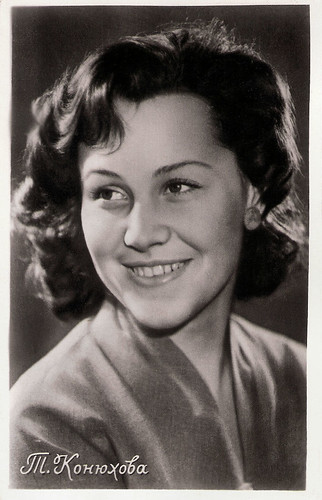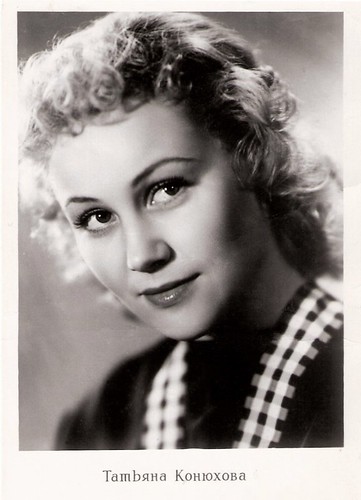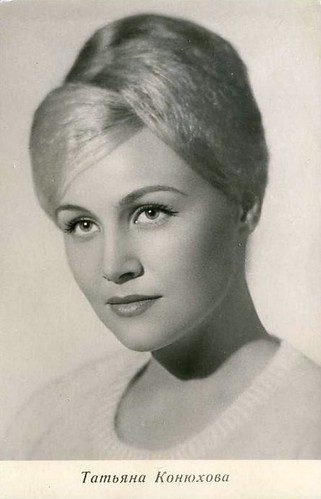Tatyana Konyukhova (1931-2024) was one of the great actresses of Russian cinema. She started her film career in the 1950s and was still active in the 1990s.

Russian postcard, no. 15, 1959. This postcard was printed in an edition of 100.000 cards. Retail price: 75 Kop.
Tatyana Georgiyevna Konyukhova was born in Tashkent, Soviet Union (now Uzbekistan) in 1931. Her parents were Georgiy Stepanovich Konyukhov and Anastasiya Denisovna Konyukhova. She had a sister, Roksana, and a brother, Igor, who died at an early age. In 1946, her father was sent to work in Latvia, and the Konyukhov family moved to Riga. She finished school in Liepaja. In 1949, she came to Moscow, where she entered the Gerasimov Institute of Cinematography (VGIK). In 1955, she graduated from the All-Union State Institute of Theater Arts. After graduating from VGIK she worked at the Malyy Theatre.
As a second-year student, she made her film debut in Mayskaya Noch, Ili Utoplennitsa/A May Night, or the Drowned Maiden (Aleksandr Rau, 1952). Her film career made a jump start and her second film, Sudba Mariny/Marina’s Destiny (Viktor Ivchenko, Isaak Shmaruk, 1953) was nominated for the Grand Prize of the Cannes Film Festival in 1954. Her next film was the successful comedy Zapasnoy igrok/The Boys from Leningrad (Semyon Timoshenko, 1954) about three brothers who are playing for one team in a National Soccer Competition. Tatyana played a beautiful girl for whom one of the brothers lost his heart and his confidence just before the final game.
In 1955, she graduated from University and worked briefly in Maly Theatre. In the years 1956-1992 she was an actress at the National Film Actors' Theatre. Films from this period were Volnitsa/Flames on the Volga (Grigori Roshal, 1955), Dobroe utro (Andrei Frolov, 1955), Pervye radosti/No Ordinary Summer (Vladimir Basov, 1956), and Solntse svetit vsem/The Sun Shines for All (Konstantin Voynov, 1959).
In the 1960s Tatyana Konyukhova went on playing in both film comedies and dramas steadily. Karera Dimy Gorina/Dima Gorin's Career (1961) was a comedy by Frunze Dovlatyan and Lev Mirsky. Zhenitba Balzaminova/The Marriage of Balzaminov (Konstantin Voynov, 1965) was an excellent grotesque about Russian life in the 19th century. The story about a poor clerk searching for a rich wife was based on the plays by Aleksandr Ostrovsky.
Also interesting was the stunning and disturbing anti-war film Csillagosok, katonák/The Red and the White (1967), directed by Hungarian director Miklós Jancsó. It tells the tale of a Hungarian unit that during the civil war supports the Red Army against the counter-revolutionary White army on the banks of the Volga. The film, a Soviet-Hungarian co-production, was originally commissioned to celebrate the 50th anniversary of the October Revolution in Russia in which the Bolsheviks seized power. However, Jancsó chose to set the action two years later in 1919 and showed Hungarian irregulars supporting the Communist 'Reds' in fighting the Tsarist 'Whites' as the two sides battled for control in the hills overlooking the Volga river.

Russian postcard, 1961.

Russian postcard. Collection: Yury Ermolenko (Flickr).
After a hiatus of ten years, Tatyana Konyukhova made a come-back playing herself in the Oscar-winning Moskva slezam ne verit/Moscow Doesn’t Believe in Tears (Vladimir Menshov, 1980), and in supporting parts in the Bulgarian drama S podelena lyubov/With Shared Love (Sergei Mikaelyan, 1980), and the romance Portret zheny khudozhnika/A Painter's Wife Portrait (Aleksandr Pankratov, 1981).
Moscow Doesn’t Believe in Tears won the Academy Award for Best Foreign Film. It is an enchanting drama of three women struggling to establish themselves in Moscow. The film follows their resourceful pursuit of professional and domestic bliss in 1958, then skips forward twenty years to see just how many of their dreams have come true. Over 93 million Soviet viewers saw the film in the cinema, making it one of the most successful films in Soviet history. In 2021, a poll conducted by Russian Public Opinion Research Center voted it as the best Soviet film of all time among Russian viewers.The title is a Russian proverb meaning "don't complain, solve your problems by yourself".
Some ten more films followed in the 1980s and 1990s. Her last films were Nostalgiya po budushemu/Longing for the Future (Sergei Tarasov, 2008) about how the economic, mental, political and social attitudes of middle-class Russian people have changed over the years, and the family film Zolotaya rybka v gorode N/The Goldfish in City N (Stepan Puchinyan, 2011). Her final television appearances were in the TV series Printsessa i nishchenka/The Rrincess and the Beggar (Stanislav Dremov, 2009) and Khranimye sudboy/Guarded by Fate (2011).
On IMDb reviewer Lalit Rao commented on Nostalgiya po budushemu/Longing for the Future: "Veteran Russian director Sergei Tarasov's film is fairly neutral as far as its political viewpoint is concerned. It is neither critical of communism nor overtly applauds capitalism."
After leaving the theatre in 1992, she worked with children at the Theatre Studio at the Moscow Children's Academy of Folk Arts in Perovo. She also taught acting at the Moscow State Institute of Culture. Tatyana Konyukhova died in Moscow 2024 at 92. She was married three times. Her husbands were Valeri Karen, a student of the film studies faculty of VGIK (1954-1954; divorced), Boris Vengerovsky, a sound engineer (divorced), and Vladimir Vasilyevich Kuznetsov, a javelin thrower and 4-time champion of the USSR (1953, 1954, 1958, 1961), and a doctor of pedagogical sciences (1959-1986; his death). With Kuznetsov, she had a son, Sergey Vladimirovich Kuznetsov.

Russian postcard, series no. 33. Caption: My favourite artists. Film stars pictured are amongst others Viktor Avdyushko and Lyudmila Khityaeva in Vsyo nachinayetsya s dorogi/Everything Begins with Hitting the Road (Nikolay Dostal, Villen Azarov, 1960), Iya Arepina in Khmuryy Vangur/Gloomy Vangur (Anatoliy Dudorov, 1959), Tatyana Konyukhova and Evgeniy Samoylov in Zare navstrechu/Dawn to meet (Tatyana Lukashevich, 1960), Nadir Malishevsky and Evgeniya Kozyreva in Vesenniye grozy/Spring Thunderstorms (Nikolai Figurovsky, 1960), and Vasily Lanovoy.
Scene from Csillagosok, katonák/The Red and the White (1967). Source: bikeydoc (YouTube).
Source: Lalit Rao (IMDb), Tango Papa (IMDb), AllMovie, Wikipedia and IMDb.
This post was last updated on 1 January 2025.

Russian postcard, no. 15, 1959. This postcard was printed in an edition of 100.000 cards. Retail price: 75 Kop.
The Boys from Leningrad
Tatyana Georgiyevna Konyukhova was born in Tashkent, Soviet Union (now Uzbekistan) in 1931. Her parents were Georgiy Stepanovich Konyukhov and Anastasiya Denisovna Konyukhova. She had a sister, Roksana, and a brother, Igor, who died at an early age. In 1946, her father was sent to work in Latvia, and the Konyukhov family moved to Riga. She finished school in Liepaja. In 1949, she came to Moscow, where she entered the Gerasimov Institute of Cinematography (VGIK). In 1955, she graduated from the All-Union State Institute of Theater Arts. After graduating from VGIK she worked at the Malyy Theatre.
As a second-year student, she made her film debut in Mayskaya Noch, Ili Utoplennitsa/A May Night, or the Drowned Maiden (Aleksandr Rau, 1952). Her film career made a jump start and her second film, Sudba Mariny/Marina’s Destiny (Viktor Ivchenko, Isaak Shmaruk, 1953) was nominated for the Grand Prize of the Cannes Film Festival in 1954. Her next film was the successful comedy Zapasnoy igrok/The Boys from Leningrad (Semyon Timoshenko, 1954) about three brothers who are playing for one team in a National Soccer Competition. Tatyana played a beautiful girl for whom one of the brothers lost his heart and his confidence just before the final game.
In 1955, she graduated from University and worked briefly in Maly Theatre. In the years 1956-1992 she was an actress at the National Film Actors' Theatre. Films from this period were Volnitsa/Flames on the Volga (Grigori Roshal, 1955), Dobroe utro (Andrei Frolov, 1955), Pervye radosti/No Ordinary Summer (Vladimir Basov, 1956), and Solntse svetit vsem/The Sun Shines for All (Konstantin Voynov, 1959).
In the 1960s Tatyana Konyukhova went on playing in both film comedies and dramas steadily. Karera Dimy Gorina/Dima Gorin's Career (1961) was a comedy by Frunze Dovlatyan and Lev Mirsky. Zhenitba Balzaminova/The Marriage of Balzaminov (Konstantin Voynov, 1965) was an excellent grotesque about Russian life in the 19th century. The story about a poor clerk searching for a rich wife was based on the plays by Aleksandr Ostrovsky.
Also interesting was the stunning and disturbing anti-war film Csillagosok, katonák/The Red and the White (1967), directed by Hungarian director Miklós Jancsó. It tells the tale of a Hungarian unit that during the civil war supports the Red Army against the counter-revolutionary White army on the banks of the Volga. The film, a Soviet-Hungarian co-production, was originally commissioned to celebrate the 50th anniversary of the October Revolution in Russia in which the Bolsheviks seized power. However, Jancsó chose to set the action two years later in 1919 and showed Hungarian irregulars supporting the Communist 'Reds' in fighting the Tsarist 'Whites' as the two sides battled for control in the hills overlooking the Volga river.

Russian postcard, 1961.

Russian postcard. Collection: Yury Ermolenko (Flickr).
Moscow doesn’t believe in tears
After a hiatus of ten years, Tatyana Konyukhova made a come-back playing herself in the Oscar-winning Moskva slezam ne verit/Moscow Doesn’t Believe in Tears (Vladimir Menshov, 1980), and in supporting parts in the Bulgarian drama S podelena lyubov/With Shared Love (Sergei Mikaelyan, 1980), and the romance Portret zheny khudozhnika/A Painter's Wife Portrait (Aleksandr Pankratov, 1981).
Moscow Doesn’t Believe in Tears won the Academy Award for Best Foreign Film. It is an enchanting drama of three women struggling to establish themselves in Moscow. The film follows their resourceful pursuit of professional and domestic bliss in 1958, then skips forward twenty years to see just how many of their dreams have come true. Over 93 million Soviet viewers saw the film in the cinema, making it one of the most successful films in Soviet history. In 2021, a poll conducted by Russian Public Opinion Research Center voted it as the best Soviet film of all time among Russian viewers.The title is a Russian proverb meaning "don't complain, solve your problems by yourself".
Some ten more films followed in the 1980s and 1990s. Her last films were Nostalgiya po budushemu/Longing for the Future (Sergei Tarasov, 2008) about how the economic, mental, political and social attitudes of middle-class Russian people have changed over the years, and the family film Zolotaya rybka v gorode N/The Goldfish in City N (Stepan Puchinyan, 2011). Her final television appearances were in the TV series Printsessa i nishchenka/The Rrincess and the Beggar (Stanislav Dremov, 2009) and Khranimye sudboy/Guarded by Fate (2011).
On IMDb reviewer Lalit Rao commented on Nostalgiya po budushemu/Longing for the Future: "Veteran Russian director Sergei Tarasov's film is fairly neutral as far as its political viewpoint is concerned. It is neither critical of communism nor overtly applauds capitalism."
After leaving the theatre in 1992, she worked with children at the Theatre Studio at the Moscow Children's Academy of Folk Arts in Perovo. She also taught acting at the Moscow State Institute of Culture. Tatyana Konyukhova died in Moscow 2024 at 92. She was married three times. Her husbands were Valeri Karen, a student of the film studies faculty of VGIK (1954-1954; divorced), Boris Vengerovsky, a sound engineer (divorced), and Vladimir Vasilyevich Kuznetsov, a javelin thrower and 4-time champion of the USSR (1953, 1954, 1958, 1961), and a doctor of pedagogical sciences (1959-1986; his death). With Kuznetsov, she had a son, Sergey Vladimirovich Kuznetsov.

Russian postcard, series no. 33. Caption: My favourite artists. Film stars pictured are amongst others Viktor Avdyushko and Lyudmila Khityaeva in Vsyo nachinayetsya s dorogi/Everything Begins with Hitting the Road (Nikolay Dostal, Villen Azarov, 1960), Iya Arepina in Khmuryy Vangur/Gloomy Vangur (Anatoliy Dudorov, 1959), Tatyana Konyukhova and Evgeniy Samoylov in Zare navstrechu/Dawn to meet (Tatyana Lukashevich, 1960), Nadir Malishevsky and Evgeniya Kozyreva in Vesenniye grozy/Spring Thunderstorms (Nikolai Figurovsky, 1960), and Vasily Lanovoy.
Scene from Csillagosok, katonák/The Red and the White (1967). Source: bikeydoc (YouTube).
Source: Lalit Rao (IMDb), Tango Papa (IMDb), AllMovie, Wikipedia and IMDb.
This post was last updated on 1 January 2025.
No comments:
Post a Comment